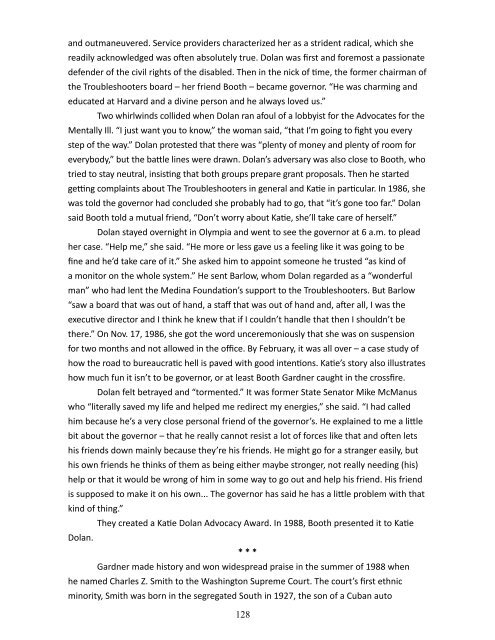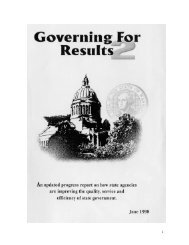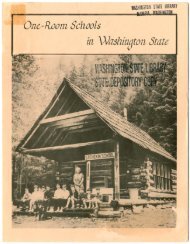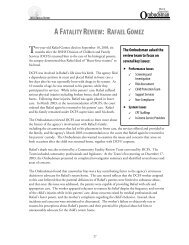BOOTH WHO? - Washington State Digital Archives
BOOTH WHO? - Washington State Digital Archives
BOOTH WHO? - Washington State Digital Archives
You also want an ePaper? Increase the reach of your titles
YUMPU automatically turns print PDFs into web optimized ePapers that Google loves.
and outmaneuvered. Service providers characterized her as a strident radical, which she<br />
readily acknowledged was often absolutely true. Dolan was first and foremost a passionate<br />
defender of the civil rights of the disabled. Then in the nick of time, the former chairman of<br />
the Troubleshooters board – her friend Booth – became governor. “He was charming and<br />
educated at Harvard and a divine person and he always loved us.”<br />
Two whirlwinds collided when Dolan ran afoul of a lobbyist for the Advocates for the<br />
Mentally Ill. “I just want you to know,” the woman said, “that I’m going to fight you every<br />
step of the way.” Dolan protested that there was “plenty of money and plenty of room for<br />
everybody,” but the battle lines were drawn. Dolan’s adversary was also close to Booth, who<br />
tried to stay neutral, insisting that both groups prepare grant proposals. Then he started<br />
getting complaints about The Troubleshooters in general and Katie in particular. In 1986, she<br />
was told the governor had concluded she probably had to go, that “it’s gone too far.” Dolan<br />
said Booth told a mutual friend, “Don’t worry about Katie, she’ll take care of herself.”<br />
Dolan stayed overnight in Olympia and went to see the governor at 6 a.m. to plead<br />
her case. “Help me,” she said. “He more or less gave us a feeling like it was going to be<br />
fine and he’d take care of it.” She asked him to appoint someone he trusted “as kind of<br />
a monitor on the whole system.” He sent Barlow, whom Dolan regarded as a “wonderful<br />
man” who had lent the Medina Foundation’s support to the Troubleshooters. But Barlow<br />
“saw a board that was out of hand, a staff that was out of hand and, after all, I was the<br />
executive director and I think he knew that if I couldn’t handle that then I shouldn’t be<br />
there.” On Nov. 17, 1986, she got the word unceremoniously that she was on suspension<br />
for two months and not allowed in the office. By February, it was all over – a case study of<br />
how the road to bureaucratic hell is paved with good intentions. Katie’s story also illustrates<br />
how much fun it isn’t to be governor, or at least Booth Gardner caught in the crossfire.<br />
Dolan felt betrayed and “tormented.” It was former <strong>State</strong> Senator Mike McManus<br />
who “literally saved my life and helped me redirect my energies,” she said. “I had called<br />
him because he’s a very close personal friend of the governor’s. He explained to me a little<br />
bit about the governor – that he really cannot resist a lot of forces like that and often lets<br />
his friends down mainly because they’re his friends. He might go for a stranger easily, but<br />
his own friends he thinks of them as being either maybe stronger, not really needing (his)<br />
help or that it would be wrong of him in some way to go out and help his friend. His friend<br />
is supposed to make it on his own... The governor has said he has a little problem with that<br />
kind of thing.”<br />
They created a Katie Dolan Advocacy Award. In 1988, Booth presented it to Katie<br />
Dolan.<br />
* * *<br />
Gardner made history and won widespread praise in the summer of 1988 when<br />
he named Charles Z. Smith to the <strong>Washington</strong> Supreme Court. The court’s first ethnic<br />
minority, Smith was born in the segregated South in 1927, the son of a Cuban auto<br />
128
















